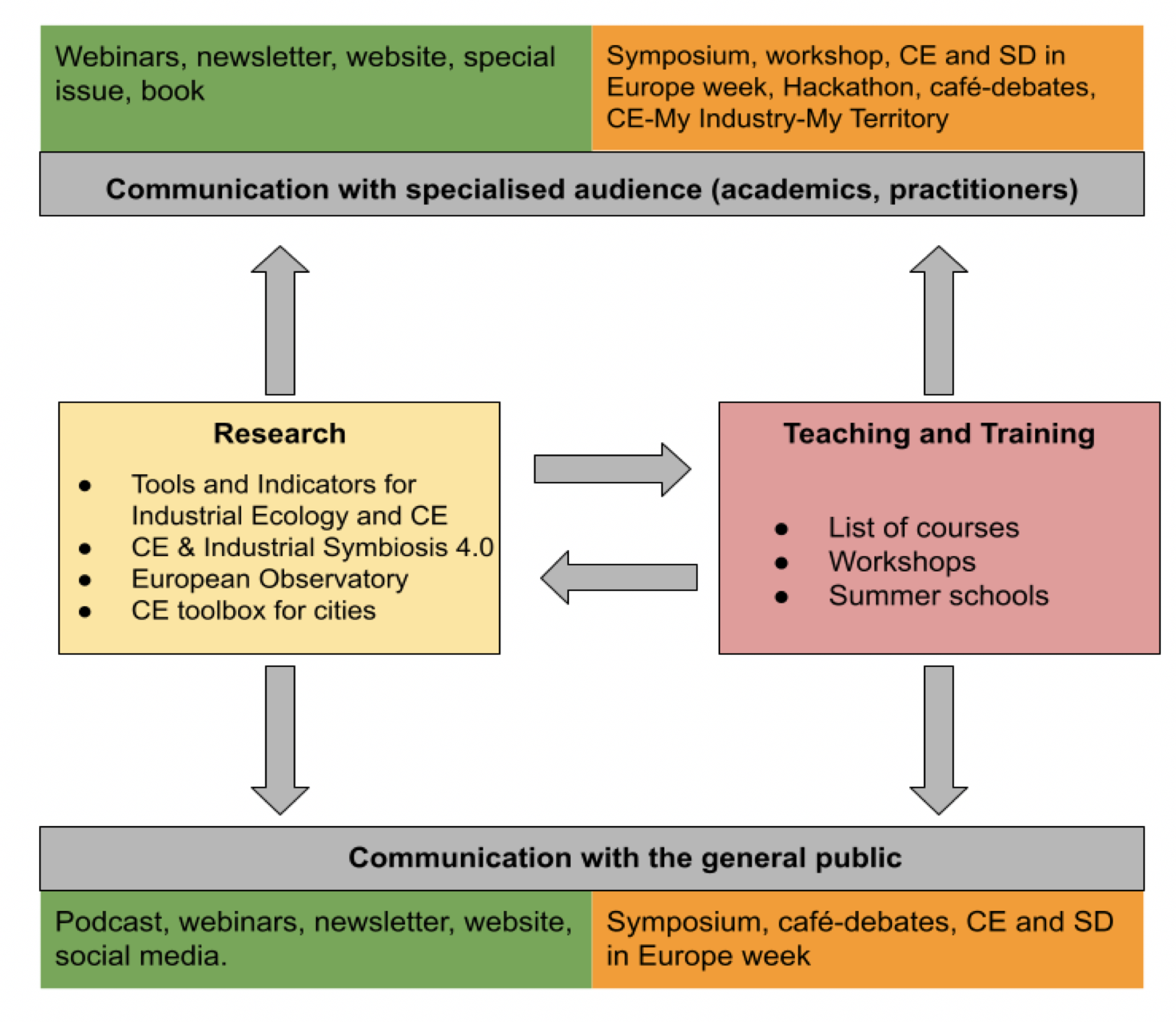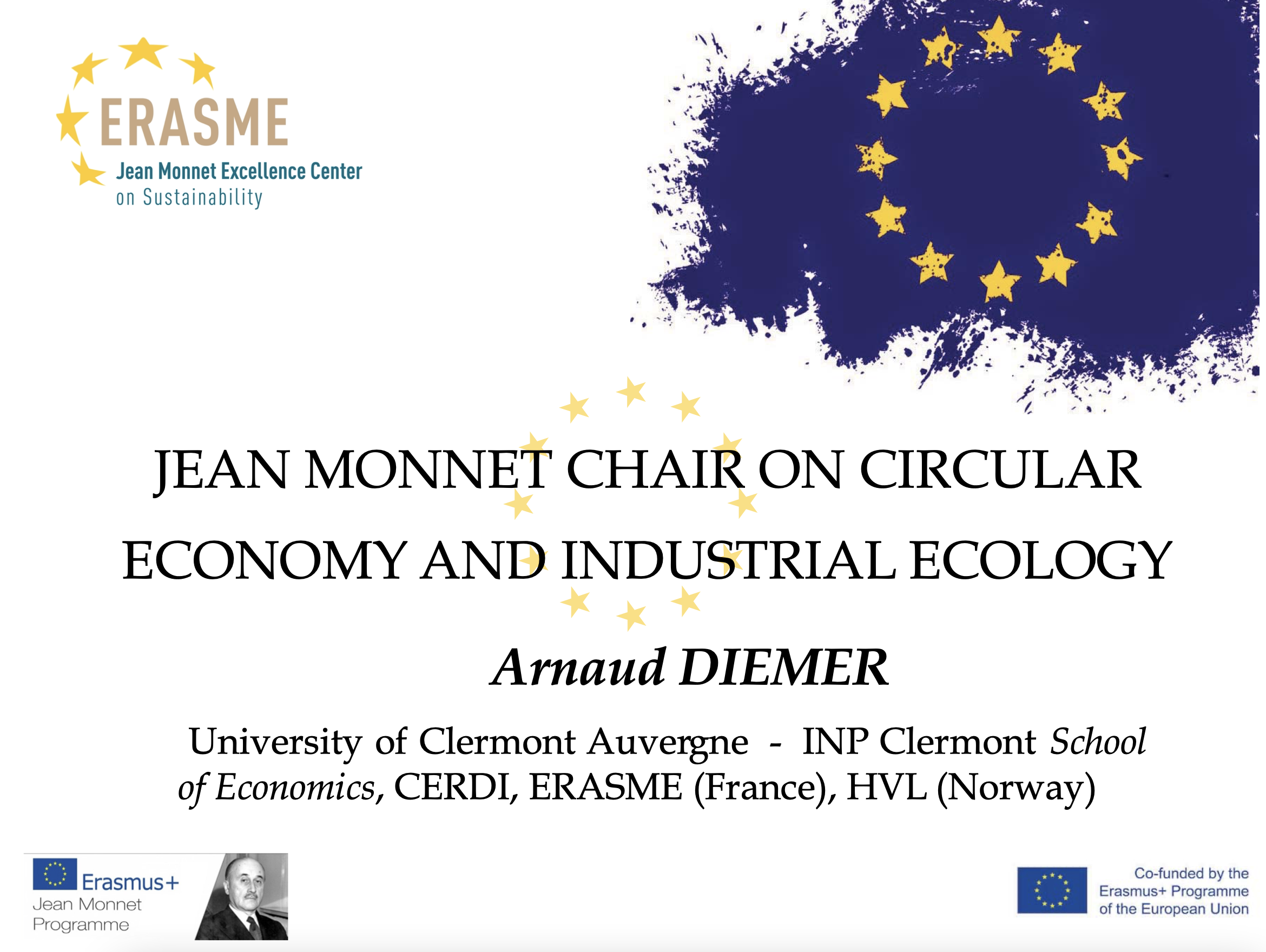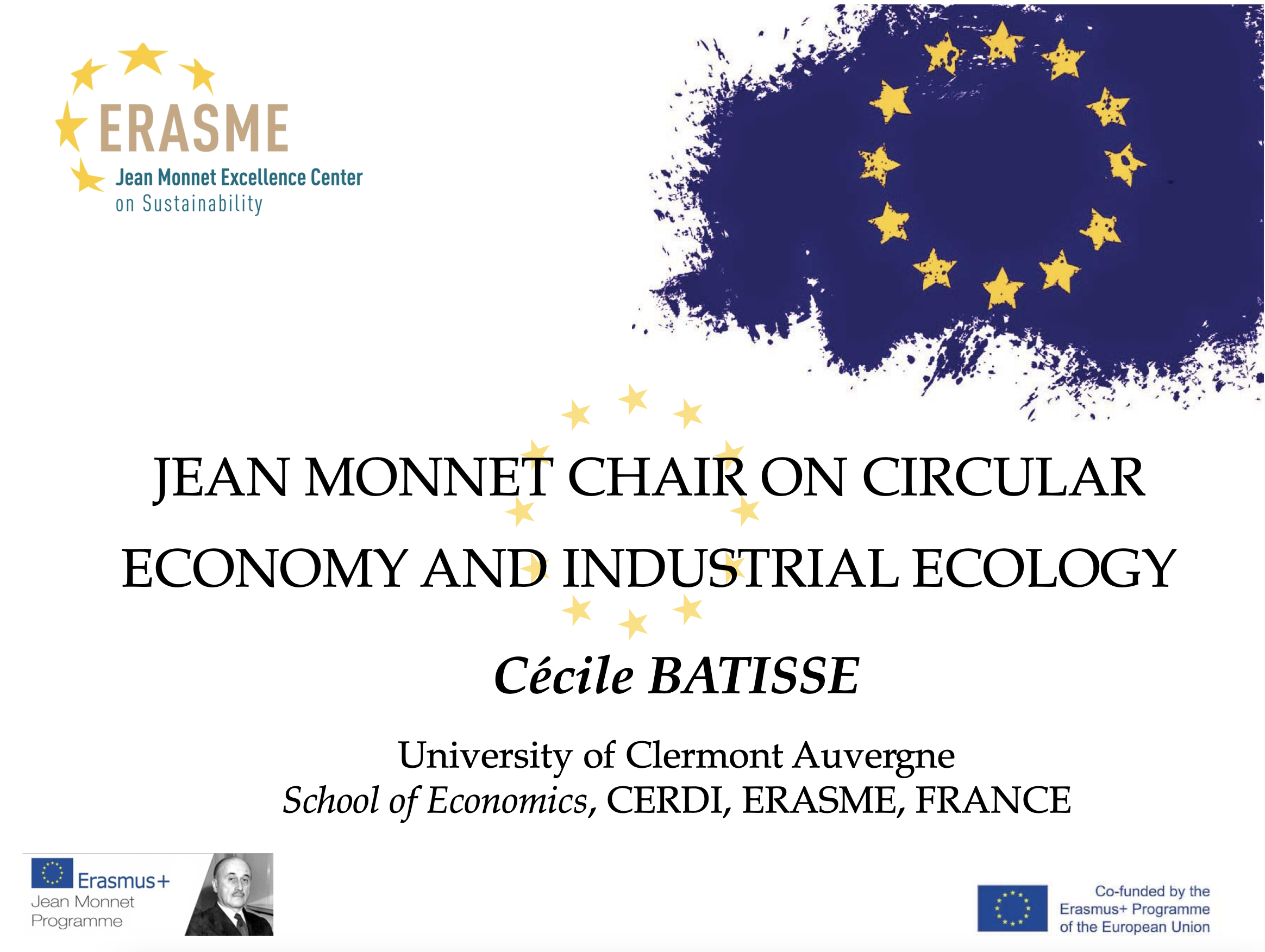Chaire Jean Monnet Economie Circulaire, Ecologie industrielle

La Chaire propose 4 types d'activités : (1) Formation, (2) Recherche, (3) Produits, (4) Évènements
The Jean Monnet “Europe, Industrial Ecology and Circular economy” Chair as set out in this work plan for implementation in Europe, intends to go beyond the 3Rs model (Reduce, Reuse, Recycle) or the strategy of decoupling the economy from the environment. Its originality rests mainly on five important postulates: 1° The circular economy must be based on a systemic approach, mobilising the dynamics of systems, integrating all dimensions of sustainability (economic, technological, social, environmental, cultural, governance, etc.), increasing the interest and engagement of all stakeholders and proposing scenarios in line with the expected results (reduction of material and energy use, and CO 2emissions; reduction of environmental footprints; social acceptance; changes in behaviour). 2° It is less a question of reducing its ecological footprint than of redrawing the contours of a biophysical model, which could incorporate economic constraints or embody a new economic model that provides viable business models for firms and social enterprises of all sizes. 3° The transition to a new form of circular economy implies the emergence of a strong sustainability model in which eco-efficiency goes hand in hand with resilience, proximity and cooperation. Cooperation is expressed in terms of symbiotic relationships. Symbiosis is the main pillar of the circular economy for Europe, especially when they integrate an industrial and urban dimension, but they also include land-use on a bioregional scale. 4° This circular economy must be deeply rooted in interdisciplinarity study (teaching and training) and calls for a qualitative approach to complement quantitative indicators and dashboards. To the economic and environmental dimensions, we associate the cultural and political dimensions which are important for Europe. All the scales of circularity change considered are embedded in social and cultural contexts and we will reflect this in the models, narratives and policy suggestions that result from this research. 5° This circular economy has to include socio-cultural change including relationships and practices that involve people’s perceptions, values and cultural attitudes. These can block necessary change as well as assist.
The work plan of the Chair includes a unique work package, as suggested by the Application form (ERASMUS JMO Chair). Work tasks have been categorized as: (1) Teaching and training activities, (2) Products, (3) Research, (4) Events. These work tasks, though proposed separately, work together to promote the nexus of teaching-research-outreach activities.

FORMATION - TRAINING
C1 : Cours "Europe, Ecologie Industrielle et Economie circulaire" (français), 25 h, Septembre - Décembre, Intervenant : Arnaud Diemer, Manuel MoralesCe cours est destiné aux élèves ingénieurs de Polytech (5e année) des options Energie, Mobilité, Gestion environnementale, aux élèves de Vetagro-Sup et l'UCO d'Angers
- Du développement durable à l'économie circulaire
- Analyse du plan d'action de l'Union Européenne en matière d'économie circulaire (Green Deal)
- Normes et législations européennes sur les déchets
- Analyse du Green Deal et des rapports de la Fondation Ellen McArthur
- Etude sectorielle (Energie et Mobilité)
- Présentation des 7 piliers de l'économie circulaire
- Industrial Territorial Management
Accès au cours
C2 : Ingénierie circulaire, (français) 25h, Septembre à Décembre, Intervenant : Arnaud Diemer
Ce cours s'adresse aux étudiants de 5e année de Polytech "Option Bio matériaux"
- Présentation du cadre d'analyse de l'économie circulaire
- Boîte à outils (MFA, LCA)
- Modélisation via STELLA et VENSIM
- Réalisation d'un projet collectif (groupe de 4 étudiants) sur la chaîne de valeur des déchets (partenaire VALTOM)
Plan de cours Cours partie 1 Cours partie 2 Rapport déchets
C3 : Modélisation en système dynamique (français), 100 h, Septembre - Mai, Intervenants : Arnaud Diemer et Cécile Batisse
Le cours est destiné aux étudiants de la licence de mathématiques et du master Economie et Transitions écologiques.
- Analyse systémique (System Thinking + System Dynamics)
- Application de l'analyse systémique à l'économie circulaire
- Modélisation d'une thématique (biodiversité, eau, ressources naturelles, énergie, déchets, mobilité...) dans un projet de territoire.
- Groupe de 4 étudiants en mode projet (modélisation + scénarios)
Rapport Agriculture - usage des terres Rapport Alimentation Rapport Biodiversité Rapport Climat Rapport Commerce local
Rapport Déchets Rapport Eau Rapport Energie Rapport Logements Rapport Mobilités Rapport Population
Rapport Qualité de l'air
C4 : Workshop "The value of Data for Circular Economy an European Industrial Policy" (english), 20 hours, August Wierling, Valeria Schwanitz (HVL)
The online workshop is composed of several lectures on the value of data for circular economy and European Industrial Policy. These lectures are a part of the training of the doctoral schools and will allow all PhD students of UCA and partners to become familiar with circular economy and european open data initiatives (lectures also giver by guest professors). Program is coming.
June 30th, 2022 - August Wierling, Valerie Schwanitz (HVL) - " Issues with defining a local scale" - 2h
July 1st, 2022 - Aneta Ivanoska (Jozef Stefan Institute, Slovenia), Artificial Intelligence for food systems - 3 h
C5 : Summer School
"System Dynamics" (online Course + Face to Face), 35 hours - "Dynamique des systèmes" - Espace Volcans -
2022 : June 22th - July 1st
2023 : June 26th - July 1st
Contact : Arnaud Diemer - arnaud.diemer@uca.fr, Manuel Morales - manuel.morales_rubio@uca.fr, Cécile Batisse - cecile.batisse@uca.fr
Accès aux écoles d'été
PRODUITS - PRODUCTS
La Chaire Jean Monnet "Economie circulaire et écologie industrielle" se propose de livrer plusieurs types de produits :1° Réalisation d'un site WEB avec une newsletter trimestrielle et une animation via les réseaux sociaux (Linkedin, Twitter)
Newsletter1 Juillet-Septembre 2022
Newsletter 2 0ctobre - Décembre 2022
2° Ressources audio - vidéos "Sustainability, Circular Economy and Industrial Ecology" en anglais présentant des apports théoriques ou des cas pratiques.
Accès au programme
3° Circular Economy Webinars (english) - Once a month (every last friday, 12.30 - 13.30),
Accès au programme
Accès aux vidéos
4° Special issue for the review Natural Resources Conservation and Research "Energy and Systems Dynamics" (2023), Guest Editors : Arnaud Diemer, Nuria Rabanal (deadline september 2023)
Accès à l'appel
5° Book "Industrial Ecology and Circular Economy in the EU Policy" (March 2025) - Editions Oeconomia
Accès au livre
RESEARCH - RECHERCHE
The Jean Monnet Chair Circular Economy and Industrial Ecology developed four research programs :T3.1 Systems Dynamics for Circular Economy
Using Systems Dynamics to map the loops, time delays and archetypes in circular economy and industrial symbiosis. This research has been designed in conceptual framework, assessment framework, tools box and models. The Chair adapts the assessment frameworks “Circles of Sustainability” and the “Circular Triangle” to integrate other methods and tools in European studies of circular economy and industrial ecology.
Access to the research project
Laureat Academy 20 - 25 - Loop Project
T3.2 Tools, Methods and indicators for industrial Ecology and Circular Economy
Develop research about the seven pillars of the circular economy to map the circularity of materials, energy, waste and water in Europe (Sankey Diagram) and cover a large spectrum of national strategies. Introducing Business models of circular economy and using life cycle analysis to challenge different sectors (building, energy, plastic). Also developing specific metrics for measuring advances in CE (plastic sector, building sector).
Access to methods
La Minute de la recherche - Juin 2023 - Economie circulaire dans le BTP Texte en pdf
Publication "Study on Certification Criteria of Building and Environmental Performance", January 2023, Sustainability
T3.3 Circular Economy and industrial Symbiosis
Industry 4.0 is the era of Cyber Physical Systems (CPS) which comprises smart machines, storage systems and production facilities capable of autonomously exchanging information, triggering actions and controlling each other independently. Data monitoring, Computing Science and software modelling are part of the Circular Economy and Industrial Symbiosis design. Softwares such as Toile Maker or Vensim and Stella will be used to map flows and stocks, time delays, reinforcing and balancing loops, potential partners synergies… This research task is focused on waste management and circular economy at the city level (and territorial level). France and Canada organized the entretiens Jacques Cartier (Monography of firms)
Entretiens Jacques Cartier - 3 novembre 2020 - L'économie circulaire - Pour un développement urbain
Leaders : Pauline Robert (CRE Capitale), Arnaud Diemer (ERASME)
Entretiens Jacques Cartier - 22 novembre 2022 - La gestion des matières résiduelles dans le cadre d'une économie circulaire
Leaders : Claude Maheux Picard (CETTEI), Arnaud Diemer (ERASME)
T3.4 Observatory of Circular Economy and Industrial Ecology (OCEIE)
Creation of an Observatory (inauguration in october, 2022) - Project Emergence funding by I-Site Cap 20 - 25 (UCA) - integrated in the Jean Monnet Chair activities. This observatory is leading by INP Clermont Auvergne and has few activities : (1) Following European Regulations on Circular Economy and Industrial Ecology, (2) Developing research with ERASME (Excellence Center on Sustainability) about Industrial Symbiosis and Circular Economy (Whitecycle Project 2022 - 2027 - European Consortium leading by Michelin Company), (3) Producing monographies on Circular Economy at the territorial Level (Puy de Dôme, Auvergne, Massif Central) and for bio-based materials (wood, straw, hemp, flax, cork, etc.); (4) Publishing articles and book on circular economy and industrial ecology.
Access to the Observatory
European Project Whitecycle (CERDI - ERASME) : 2022 - 2027
T3.5 Multicriteria-Tool to evaluate public policies for implementing circular Economy in cities
Cities, in their quest for sustainability, are increasingly engaging in the circular economy and the implementation of industrial symbioses. The complexity of their ecosystems (population, food, waste, mobility, water, energy, etc.) requires them to have tools for modelling these complex situations and for devising the main orientations of public policies. The Europe Industrial Ecology and Circular Economy Chair is working - in collaboration with the Western University of Sydney (Circles of Social Life, the Possibilizzeurs company (toile maker) and the Millennium Institute (iSDG model) - on the creation of a multi-criteria tool for evaluating public policies. This tool will be tested in Europe and internationally via an agreement signed between the Jean Monnet Centre of Excellence on Sustainable Development (ERASME) and the International Michelin Cities Network. Fact sheets describing the implementation and strategy of these cities in terms of the circular economy will be produced for the 40 cities of the Michelin network and integrated into the Jacques Cartier Meeting.
Leaders : Derek Chan, Arnaud Diemer, Cécile Batisse, Eduard Nedelciu, Nathalie Spittler, Paul James, Matteo Pedercini, Gemma Cervantes, Pauline Houssin, Manuel Morales
Access to the project IATB LOOP (CERDI, AUF)
Access to International Michelin Cities Network
Circular Economy Workshop with INMC (october, 2021)
IATB LOOP Laureat from AUF (2021 - 2022)
EVENEMENTS - EVENTS
The Jean Monnet Chair Circular Economy and Industrial Ecology organizes four types of events :T4.1 Symposium “Green Deal, Circular Economy and Industrial Symbiosis” (October, 3rd and 4th, 2024)
Climate change and environmental degradation are a threat to Europe and the rest of the world. To tackle this, Europe needs a new growth strategy that transforms the Union into a modern, competitive and resource-efficient economy, where net greenhouse gas emissions are reduced to zero by 2050, where growth is decoupled from resource use, and where no one and no place is left behind. The Green Deal for Europe is the roadmap for the next 50 years, aiming to make the EU economy sustainable. The symposium aims to take a closer look at all areas of the Green Deal: measures to protect our fragile ecosystem (biodiversity), ways to ensure a more sustainable food chain, sustainability in agriculture and rural areas through the Common Agricultural Policy, clean energy, sustainable industry, sustainable mobility, pollution abatement, efficient waste management, etc. The symposium will also present the results of research from partners involved in European Projects.
T4.2 “Circular Economy” in European Sustainable Development Week (September - October each year)
As part of Europe Week and Sustainable Development Week, the Chair of Europe, Industrial Ecology and Circular Economy will join the events organised by the University of Clermont Auvergne and its partners. Two days per year will be designed around 4 events: (i) two conferences given by two experts, partners of the Chair, followed by a round table with former MEPs to discuss the main challenges of the Green Deal (in partnership with the Association of former Members of the European Parliament), (ii) a meeting with engineering students to talk about Europe and its achievements, (iii) a radio programme (partner France Bleu) on examples of circular economy (iv) a plenary conference in the evening open to the civil society (in partnership with the City of Clermont-Ferrand).
Les journées de l'économie JECO - Les objectifs du développement durable, Lyon
Emissions H20 - France Bleu - Economie sociale et solidaire - Territoires 0 chômeurs
T4.3 After Developments days (distance learning)
Organisation of lectures about development, growth, circular economy ... from North and South. Some lectures are associated with Podcasts
This event takes place once a year, in December. month - Monday, 19.30 - 21.30. It will be co- organised with local associations - Platform 21, Association GREFFE, CISCA...
Access to After Development Days Lectures
Leaders : Eduard Nedelciu, Manuel Morales, Arnaud Diemer
T4.4 Circular Economy, My industry, My territory
Cycle of games - conferences - debates - on Europe and the circular economy relocated on the territory and in companies. This is an educational innovation, which aims to move to different places (villages, local authorities, companies, etc.) to introduce and debate with employees of a company, staff of a local authority, inhabitants of a village. A participatory approach will allow us to understand the major challenges of the circular economy for Europe. We will use two board games: the grid (create an energy network between European cities) and Into the loop (connection between the use and origin of raw materials and the choice of energy sources). This event will be organised with the scholars of ESC (business school). Leaders : Valeria Schawnitz, Arnaud Diemer, Cécile Batisse, August Wierling
Accès à la Clermont Innovation Week, April 3, 2023
Accès aux jeux The Grid - Into the Loop
Conférence (Arnaud Diemer), Degrowth, Circular economy and Hunger, Hunger Done, CIFAL Istanbul of UNITAR, October 20th , 2022
Conférence (Arnaud Diemer) du 31 mai 2023 autour de la transition énergétique en Europe, Europe Direct - Prix LUX du Parlement européen
Symposium of Logistics "Digitalization", Toros University, Turkey, 8-9 june 2023
T4.5 Hackathon
The idea of the hackathon is to explore options for citizens to actively get involved in circular economy activities. Ideas to be explored by participating teams could include idea concepts, mockups, apps, platform collaborations, etc. A price will be awarded. The hackathon will be organized as a contribution to the annual meeting of the Joint Programs “Digitization for Energy” and “Economic, Environmental, and Social Impacts of the Energy Transition” of the European Energy Research Alliance. In this way, participating students also have the possibility to network with researchers and to present their ideas. Moreover, the city of Clermont-Ferrand as well as the student business lab at the Western Norway University of Applied Sciences will issue a prize for the three top winning teams.
Leaders : Valeria Schwanitz, August Wierling, Timothy Marcroft, Constantin Beck
Hackathon Explanation Hackathon Pich Presentation Bottom up Approches in the circular economy Bottom up Circular Economy script
Presentations about definitions frameworks Script Circular Business vs linear business Script Frameworks Citizen examples
Student présentation 1 Student presentation 2 Student presentation 3 Student presentation 4 Student presentation 5


Arnaud Diemer
Cécile Batisse
Equipe (Team)
Manuel Morales
Eduard Nedelciu
Nathalie Spittler
Fabrice Audonnet
Vincent Verney
Lionel Bastier
Sébastien Marchand
Pauline Houssin
Paul James (University of Sydney)
August Wierling (HVL)
Valeria Schwanitz (HVL)
Partenaires
Derek Chan (Millennium institute)
Matteo Pedercini (Millennium Institute)
Nuria Rabanal (Léon University)
Gemma Cervantes (Barcelona Polytech)
Alessandro Sciullo (Turin University)
Valeria Di Cosmo (Turin University)
Aneta Trajanov (Institute Josef Stefan)
Claude Maheux Picard (CETTEI)
Julien Beaulieu (CETTEI)
Anne Vahaecke (Possibilizzeurs)
Pierre Dewaele (Possibilizzeurs)
Marie Schellens (Erasme)
Jurij Giacomelli (Circular Economy Academia)
Pinar Ozuyar (Istinye University)
